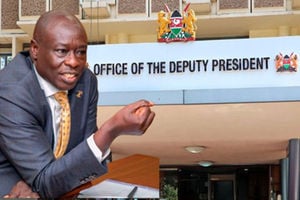
Rigathi Gachagua.
Parliament has questioned how the courts expect impeached Deputy President Rigathi Gachagua to work with President William Ruto given that he was removed from office for allegedly undermining his boss and contradicting cabinet decisions, fresh court filings show.
While agitating for the setting aside of the orders issued by the Kerugoya High Court, the National Assembly pointed out that a remedy for reinstatement of Mr Gachagua becomes “even more remote” given that he was removed from office for undermining the President and contradicting high-level policy decisions.
Attorney-General Dorcas Oduor has also sought for the lifting of the order arguing that the judge granted an order that had not been sought by the petitioners.
She further said the order has far-reaching implications since at the moment, there is no substantive deputy president in office, yet the constitution does not envisage a vacuum in the office.
“The constitution does not envisage a vacuum in the office of the Deputy President and as such, it is in the interest of justice that the interim orders herein be set aside or varied,” Solicitor General Shadrack Mose said in affidavit.
Mr Mose further defended the removal of Mr Gachagua saying the entire impeachment process followed the constitutional process.
The court hearing of the applications, seeking to lift the order, will be heard on Tuesday, October 29.
In the order, Justice Mwongo prevented any persons including Prof Kindiki from assuming office.
Mr Mose said the judge did not give any reason for his decision or a rational explanation as to how he arrived at the orders.
“That the honourable court erred in law by issuing an order that was not sought by the applicant ex-parte contrary to well established principles on issuance of the same,” he added.
The Clerk of the National Assembly Mr Samuel Njoroge said the constitution does not anticipate a dysfunctional cabinet, and “actually, conservatory orders cannot be issued where they are capable of undermining a legitimate constitutional policy or a functioning executive”.
“Public interest necessitates the setting aside of the ex-pater orders, pending the hearing of all parties,” Mr Njoroge said in an affidavit filed in court.
Mr Gachagua was removed from office following a resolution of the Senate that found him guilty of several counts of gross misconduct.
The impeached DP and other petitioners rushed to court and obtained an order blocking his replacement pending the determination of more than 30 cases challenging the impeachment process.
Mr Gachagua argued that he was denied his right to fair hearing and a public participation exercise conducted by Parliament was a sham.
Parliament, however, said in the application that Justice Richard Mwongo, sitting in Kerugoya granted an order, which was final in nature, offending the rules of natural justice which dictates that both sides ought to be heard before issuing such an order with far-reaching implications.
Further, Mr Njoroge said the court issued the order without ascertaining whether the judge had the jurisdiction to entertain matters concerning the impeachment process, which under Article 95 and 96, vests Parliament with the exclusive mandate to hold the Executive accountable through mechanisms including impeachment.
Through lawyer Eric Gumbo, Parliament said the Judge issued the ex-parte order with the effect of reviewing the impeachment proceedings contrary to the doctrine of political questions when Mr Gachagua ceased to hold office on October 17, 2024 when at least two-thirds of all members of the Senate voted to uphold the impeachment charge against him.
He said stopping the resolution of the Senate will lead to a significant constitutional crisis.
Mr Gumbo further said the petitioners including David Mathenge, Peter Kamotho and Grace Muthoni Mwangi did not reveal to the court that some of the issues they sought to suspend had already been overtaken by events.
This included the fact that the Speaker of the Senate Amason Kingi had published a gazette notice on the resolution to remove Mr Gachagua and his National Assembly counterpart Moses Wetang’ula had issued a notice for a special sitting that was held on October 18, 2024.
On the same day, Mr Gumbo said, President William Ruto had submitted to the National Assembly the name of Prof Kithure Kindiki for confirmation as the Deputy President and the appointment was confirmed.
“Unless the notice of motion is allowed as prayed, the entire of the proceedings even if the applicant (Parliament) is eventually successful, will be rendered nugatory in view of the ex parte orders issued by the Superior Court which have far reaching implications and portend a constitutional crisis,” Mr Gumbo said.
Mr Gachagua moved to court challenging the basis on which the Senate endorsed the charges for his removal, arguing that all the allegations were not substantiated or supported by evidence.
Two attempts to scuttle the hearing of the petitions have so far been defeated
The first application by the petitioners, questioning the appointment of Justices Eric Ogola, Anthony Mrima and Dr Freda Mugambi by Deputy Chief Justice Philomena Mwilu, to hear the cases was dismissed by the judges saying the DCJ had the powers to appoint a bench in the absence of the Chief Justice.
The petitioners later filed an application seeking the recusal of the judges over alleged bias and lack of impartiality, for being close to some parties in the case, but it was equally dismissed.
While dismissing the application questioning their appointment, the three judges maintained that they were committed in the duty and would not be swayed by any form of intimidation, regardless of its source.
“We assure all parties that their right to a fair hearing remains fully safeguarded. The bench, acting in fidelity to its oath of office and in strict adherence to the dictates of the constitution, remains resolutely committed to the fair and just determination of the issues before it,” said the judges.






